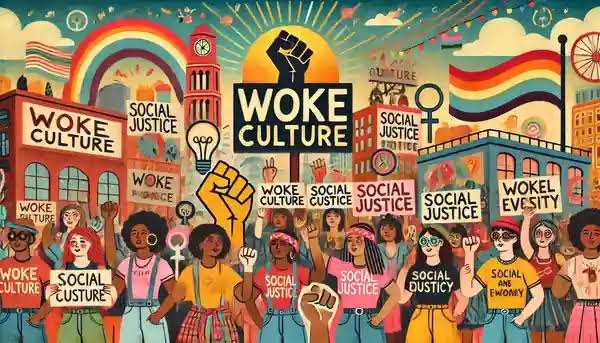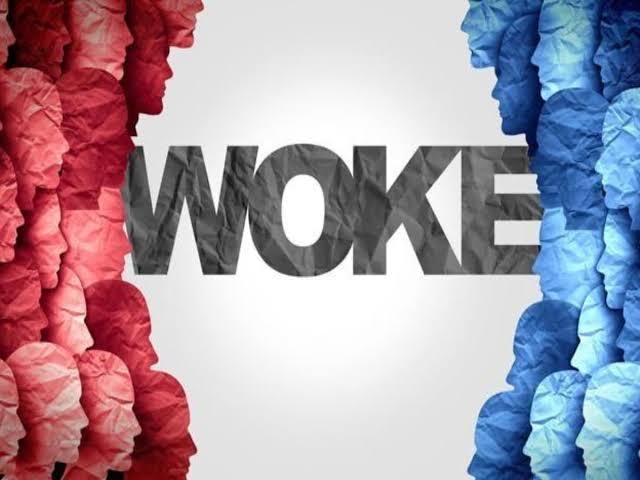Wokeism and Cancel Culture: The Hidden Agenda of the Neo-Leftists
Wokeism and Cancel Culture pose a significant threat to the fabric of society. By promoting ideological conformity, suppressing free speech, and deconstructing cultural traditions, these movements undermine the very principles that allow for a healthy, pluralistic society.

The rise of Wokeism and Cancel Culture marks a significant shift in the cultural and ideological landscape of the 21st century. These movements have morphed into tools of ideological enforcement, promoting a worldview that aligns with the tenets of neo-leftist and Marxist thought.
While the "so-called" progressive agenda may appear innocent or even virtuous on the surface, a closer examination reveals a more troubling undercurrent that threatens to erode the very foundations of society.
The Origins of Wokeism: From Civil Rights to Cultural Revolution
The term "woke" originally referred to a heightened awareness of racial inequality, particularly among African Americans. It was an expression of solidarity with the civil rights movement, seeking to highlight and address systemic racism.
However, as time has passed, the concept has expanded into a broader socio-political ideology, encompassing issues like gender identity, LGBTQ+, environmentalism, and decolonization.

Wokeism is now about reordering society according to a radical leftist worldview. This ideological shift is not spontaneous—it is the result of decades of influence from the Frankfurt School, Marxist thinkers, and neo-left intellectuals who have actively sought to transform culture by undermining existing institutions and power structures.
The Frankfurt School: Architects of Cultural Marxism
The intellectual groundwork for Wokeism can be traced back to the Frankfurt School, a group of Marxist theorists who fled Nazi Germany and sought to apply Marxist thought to culture rather than economics.
They argued that to overthrow capitalist societies, it was necessary to attack the cultural and ideological underpinnings that sustained them, particularly the family, religion, and national identity.

The Frankfurt School’s most infamous contribution was the development of “Critical Theory,” which sought to critique traditional cultural values and institutions.
In the modern context, this has morphed into the critical studies we see in academia today—critical race theory, gender studies, and postcolonial theory. These ideologies view traditional cultural values not as neutral, but as tools of oppression designed to perpetuate the dominance of the ruling class.
This intellectual tradition is the bedrock of Wokeism. Today, the idea that social structures must be deconstructed to root out oppression is central to both the academic and activist wings of the movement.
In essence, Wokeism is the manifestation of Marxist thought in the cultural domain, where the oppressor-oppressed binary is no longer about class, but about race, gender, and sexuality.
Neo-Leftism: Identity Politics and the Erosion of Unity
While Marxism originally focused on class struggle, neo-leftism has shifted its focus to identity politics. This new leftist movement asserts that issues of race, gender, and sexual orientation are the primary axes of social struggle.
Neo-leftism is premised on the idea that individuals should primarily be understood and categorized according to these immutable characteristics, rather than as individuals with unique experiences and opinions.
This focus on group identity has fostered a divisive, us-versus-them mentality, where individuals are judged by their membership in certain identity groups, often to the exclusion of their personal merits or actions.

It is here that the real danger of Wokeism lies: by prioritizing group identity over individual agency, the movement fractures society, replacing unity and shared values with division and resentment.
Moreover, the emphasis on victimhood within Wokeism encourages a sense of entitlement and moral superiority among those deemed “oppressed.” This has led to a culture of perpetual grievance, where individuals are not encouraged to rise above their circumstances but to dwell on their victimhood as a means of gaining social currency. This, in turn, fuels the Cancel Culture phenomenon, where people are “canceled” for failing to conform to the ever-evolving set of woke standards.
Cancel Culture: The Weaponization of Moral Purity
Cancel Culture, an extension of Wokeism, is a phenomenon in which individuals, brands, and even entire institutions are ostracized for making statements or taking actions that are perceived as offensive or non-compliant with the prevailing ideological norms. This practice, driven by social media mobs, has become one of the most insidious aspects of the Woke movement.
In its most extreme form, Cancel Culture acts as a form of ideological inquisition, where even the slightest deviation from the accepted narrative can lead to public shaming, professional ruin, and social ostracization.

The mob-like nature of Cancel Culture makes it difficult for individuals to defend themselves, as they are often condemned without a fair hearing or due process. What is particularly troubling about Cancel Culture is the lack of nuance. An individual’s entire career or reputation can be destroyed based on a single comment or action taken out of context.
The focus is no longer on understanding differing viewpoints or fostering productive debate but on enforcing ideological conformity through fear and intimidation.
The Role of Global Elites: Soros, Gates, and the Agenda Behind Wokeism
The rise of Wokeism and Cancel Culture has not been an organic, grassroots movement; rather, it has been nurtured by powerful elites, both in the political and economic spheres. Figures like George Soros and Bill Gates have been instrumental in funding the ideological shifts that underpin Wokeism.
Soros, through his Open Society Foundations, has funded various organizations. His focus on so-called “democratic values” often translates into support for left-wing movements that push for open borders and the erosion of national sovereignty. Similarly, Gates’ philanthropic endeavors in the fields of education, health, and technology often align with the broader leftist agenda.

These billionaires, through their foundations, are advancing a form of globalism that seeks to impose Western values on societies around the world, disregarding local customs, traditions, and cultural identities. What appears as benevolent philanthropy may, in fact, be part of a larger strategy to create a uniform global society that is more easily manipulated by elite interests.
Wokeism in India: The Import of a Foreign Ideology
While Wokeism has gained significant traction in the West, it is increasingly influencing countries like India, where it clashes with deeply entrenched cultural and religious values. The Indian Left, with its roots in Marxism, has found common cause with Woke activists, especially in areas like gender rights, and LGBTQ+ issues.
The influence of global elites like Soros and Gates is also being felt in India, where their foundations fund various initiatives promoting same causes. The funding of NGOs and think tanks that support these ideas has led to a growing alignment between India’s leftist intellectuals and the global Woke movement.
The Dangers of Wokeism: A Threat to Freedom and Tradition
Wokeism and Cancel Culture pose a significant threat to the fabric of society. By promoting ideological conformity, suppressing free speech, and deconstructing cultural traditions, these movements undermine the very principles that allow for a healthy, pluralistic society.
The focus on group identity over individual autonomy fosters division and resentment, and the stifling of dissent through Cancel Culture prevents meaningful dialogue and intellectual growth. Moreover, the embrace of Marxist and neo-leftist ideologies that prioritize state control and the dismantling of traditional structures is a dangerous precedent.
Wokeism, far from being a progressive force, represents a regressive ideology that seeks to replace one set of oppressive systems with another, more insidious form of control. For countries like India, the challenge will be to resist the allure of Western ideological trends while protecting the cultural heritage that has defined the nation for millennia.


